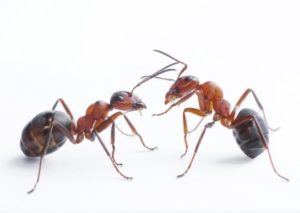Many Social Insects Bury Their Dead
You may have assumed that humans were the only types of animals that indulge in the unpleasant business of burying the dead. We humans bury our dead out of respect, and also to prevent the spread of disease. It turns out that there exists other types of animals that bury their dead as well. If you were to guess which type of animal buries their dead, then you would probably consider relatively intelligent mammals. But you would be wrong. Surprisingly, tiny ants and other social insects make special arrangements for disposing of their deceased colony members. Termites, bees, and ants treat the dead among their species with care. These insects will either bury their dead or will remove and properly dispose of corpses found within their colonies.
Much like humans, social insects bury their dead in order to avoid disease. Disposing of corpses in a way that keeps pathogens contained is of great importance to social insects since they live in crowded spaces where disease can easily spread. By burying their dead, social insects are ensuring that the rest of the colony remains free from disease.
Ant workers can be considered the undertakers within ant colonies. After removing a dead ant from a colony, ant workers travel far away from the colony in order to dispose of their dead within trash piles. Some ants even place corpses into specialized chambers within their nests. Other ant species always bury their dead.
Honeybees quickly dispose of diseased or dead colony members by using their jaws to drop dead bees to the ground. Honeybees remove dead bees from a colony faster than they remove debris. In fact, a study conducted in 1983 showed that honeybees are able to discriminate between fresh corpses and one-hour-old corpses. Honeybees always remove the older corpses first, as older corpses have collected more pathogens than fresh corpses. Honeybee colonies have specialized workers that are tasked with corpse removal. Only one to two percent of honeybees within a colony serve as bee undertakers.
Do you think that all social insects remove their dead from the rest of the colony in order to preserve the survival of the entire colony?
Tags: pest control




